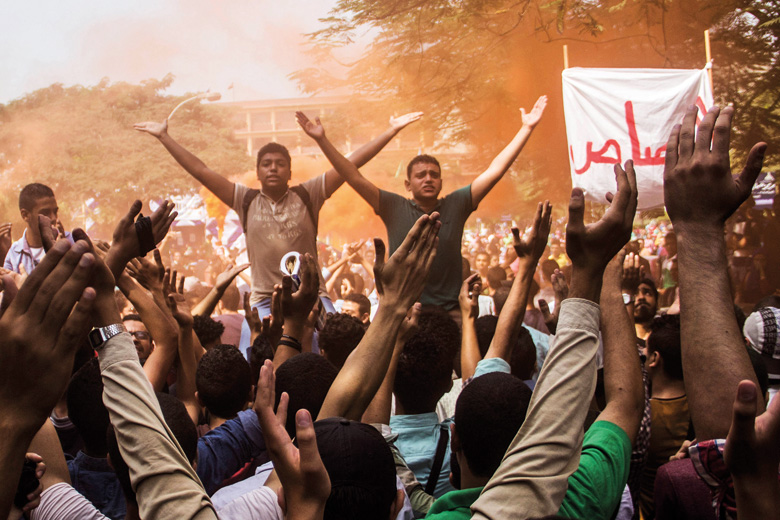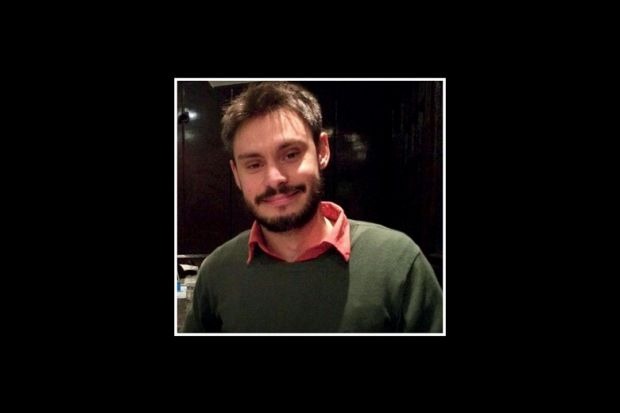A handsome young man in an open-necked pink shirt smiles warmly, if a little awkwardly, into the camera. Of the numerous images you can find online of Giulio Regeni, this is the one that most people will be familiar with. It is the one that accompanied most of the February news stories reporting the shocking murder of the University of Cambridge doctoral candidate at the hands of as yet unidentified forces in Egypt.
Regeni was in the second year of his doctorate and had been living in Cairo since September, researching Egyptian labour rights as a visiting scholar at the American-University in Cairo. His half-naked body was found dumped in a ditch beside a road on the outskirts of Cairo. According to initial reports, he had been tortured for about a week – with beatings, stabbings and cigarette burns – before his death. Egyptian government sources have suggested variously that he had been the victim of a traffic accident, a kidnapping, a lover’s argument or even a Muslim Brotherhood attempt to destabilise relations between Italy and Egypt.
According to Paz Zárate, one of Regeni’s friends and an international lawyer who has been campaigning for his killers to be brought to justice, the Egyptian authorities were “trying to show that this was a private crime motivated by passion or drug taking. They’ve tried so many things, but one of them was to say that this was a crime of passion of a homosexual nature. It’s just mind-blowing.” The suggestion that Regeni was homosexual is “completely false”, she says.
Many observers strongly suspect the involvement of the Egyptian military government itself in the murder. Led by Abdel Fattah el-Sisi, the regime overthrew its democratically elected predecessor, led by the Muslim Brotherhood, in 2013 and is reportedly very suspicious of the kind of independent trade union activity that Regeni was researching. Reports in April that Regeni had been picked up by plain-clothes policemen shortly before his death only added to the suspicion that Regeni was interrogated by the security services about his union sources before being murdered.
Further fuel was added to that fire by Egypt’s alleged failure to pass on vital evidence to Italian prosecutors, which led the Italian government to withdraw its ambassador to Cairo in April. UK academics were also quick to interpret Regeni’s death as an attack on academic freedom, and a petition calling on the UK government to ensure that his murder was properly investigated attracted the 10,000 signatures necessary to trigger a mandatory response from the government by early April. The response expressed disappointment over the “limited progress made in the case” and concern that “Italy has not found the cooperation that Egypt has provided to them to be sufficient”. Noting the “unproven” allegations about the involvement of the Egyptian security services in the murder, it urged the country’s “authorities to consider every possible scenario as they investigate”.
However, just over six months on from the murder, we are still no closer to learning the truth, and recrimination is rife. Stories in the Italian media last month – repeated by Mario Giro, the country’s deputy minister of foreign affairs – claiming that Cambridge academics had refused to fully cooperate with the Italian investigation provoked angry denials. On 16 June, the UK’s Campaign for the Public University wrote an open letter to the Italian media stating that “what was reported was simply not true”, adding that “to suggest that Regeni’s teachers and friends, who are still devastated by this shocking event, are ‘indifferent’ is insulting and absurd”.
The letter also criticised claims that Regeni’s supervisors were “dissidents” who “irresponsibly sent Regeni to undertake ‘participatory research’ in a country with an oppressive regime like Egypt”.
“Neither Regeni nor the university can be accused of being reckless or irresponsible, as no foreign student, researcher or academic had ever been murdered in Egypt before Regeni went there,” it added.
Amid all this wrangling and controversy, it is easy to treat that ubiquitous photo of Regeni as something of an icon: to regard it – and him – as an essentially abstract representative of academia, or Cambridge, or Italy. But those who actually knew him are keen to dwell on the outstanding personal and intellectual qualities that make his loss all the more tragic.
Glen Rangwala, a lecturer in Cambridge’s department of politics and international studies, who got to know Regeni when the Italian was doing a master’s degree in development studies at Cambridge. In the obituary Rangwala wrote for the departmental website, he called him a “highly promising young scholar”. And, like Zárate, he is angered by all the “misconceptions” surrounding his former student.
Some have suggested that Regeni, who was attached to Girton College, was involved with underground union activism in Egypt. That perception was perhaps fuelled by the posthumous publication by Italian newspaper Il Manifesto of a report by Regeni of a union meeting in Cairo in which unions rallied in support of workers’ rights and trade union freedoms, in defiance of state of emergency rules.
But Rangwala is scornful. “That he was working with covert organisations, first, is inaccurate and, second, doesn’t capture what his work was about,” he tells Times Higher Education. “That is my major problem with the way in which he’s been reported. He was primarily looking at economic change and development within Egypt and the wider Middle East. His academic interest wasn’t about political repression. He was looking at the ways in which the organisation of the labour sector does or does not contribute towards economic development.”
Regeni was interviewing a range of people – government officials, labour organisers and people who “were or were not joining in the labour unions” – according to Rangwala. “He wasn’t covert in that sense, he was sourcing his work across a range of official and unofficial institutions and was presenting what he was doing to those people to whom he was speaking.”
Moreover, his approach marked Regeni out among Middle-Eastern scholars: “Most people focus on the politics of the region. [Regeni] had a distinct slant…which gave him something new to say that wasn’t commonly conceived at an academic level in a particularly advanced way,” Rangwala says. “He had a very well-developed set of ideas about how he wanted to understand the changing nature of the politics and society of the Middle East. In that sense, he had quite a keen set of interests in understanding economic and social organisational change in the region to an extent which you don’t usually see [in] students coming straight out of an undergraduate degree…He could talk about the politics of Morocco, Syria [and] Yemen fluently…that just reflected the breadth of his own reading and thinking.”

Zárate got to know Regeni when they were colleagues at thinktank Oxford Analytica, where Regeni worked after his master’s, before returning to Cambridge for his PhD. She recalls how excited he was to have been accepted for his doctorate.
“Cambridge was his intellectual home,” she says. “He felt stimulated among other people who were as [academically] worthy as [he was].”
Regeni’s scholarly gifts were also apparent during his undergraduate study in Arabic and politics at the University of Leeds, where he earned a first-class degree. Hendrik Kraetzschmar, associate professor in the comparative politics of the Middle East and North Africa at Leeds, taught him during his final year.
“Clearly, a lot of our undergraduate students don’t know the way in which they are heading,” he says. “But all of us would have said [Regeni] clearly had the hallmarks of a scholar – of someone who could easily go into academia – given the way he handled subjects and was able to construct an argument: all the ingredients you need to pursue an academic career. He got incredibly high marks. He got 79s in content modules...The highest I’ve ever given is a 76.
“He was very astute at employing the theoretical literature and presenting original arguments to criticise and critically engage with the literature, and that’s something I didn’t necessarily see with many other students.”
But, for all his accomplishments, Regeni remained unassuming and generous. Friend and fellow Cambridge PhD student Viv Steel (not a real name) calls him “one of the kindest people I had met in a very long time. He was incredibly low-key…You know how you can sometimes talk to someone and within half an hour they have strategically woven in all their accomplishments? He was not one of those people. He was truly a buddy – he was a guy’s guy, a girl’s guy; just a genuinely good person. Every email was so collegial and he was always looking to help you out. If he came across an article he thought would be useful for you, he would instantly send it.”
This openness, according to Steel, belied the frequent insularity into which many PhD students are pushed by the scale of the personal challenge they are grappling with.
“It was very easy to discuss…your academic material with him,” Steel says. “I always felt I could be very honest, not just about everything that went right, but also about things that were going wrong. I didn’t feel a sense of competition with him in any way.”
Regeni’s choice of doctoral project went hand-in-glove with his humanistic instincts, Steel adds: “He was genuinely involved with the welfare and well-being of normal Egyptians. For him, it didn’t feel like a work project.” That distinguished him from the many Western scholarly “cowboys” who work in turbulent regions because “it gives them a sense of adventure” but who do not take the trouble to get under the skin of the locals.
“You go to a place like Cairo and you meet all these [Western academics] who don’t really speak the language [and] don’t really interact with Egyptians who aren’t Westernised,” Steel says. “Giulio was interested in all layers of the Egyptian population: it wasn’t just about key activists. He really saw the potential and beauty in everybody there. I really appreciated that, because that is quite extraordinary. It should be normal but it isn’t.”
For Zárate, Regeni was “like a brother to me. He was extremely cultured and mature for a person of his age. The way he saw the world, the reflections he had, were beyond his years.” She recalls how Regeni, already fluent in Italian, Arabic, English, Spanish and – at her suggestion – French, also planned to learn Lithuanian, so that he could speak to his girlfriend in her native language. “He was a citizen of the world,” she says. “He could jump from one culture to another so easily. All people could really connect with him.”
Despite the all-consuming nature of PhD study, Regeni had begun to consider what he might do afterwards. Rangwala, who met him on many occasions to discuss his future, says that he was contemplating staying in academia and had already made tentative enquiries about gaining teaching experience and postdoctoral positions.
But he seems to have had other options in mind too. According to Steel, although their conversations about the post-PhD future were infrequent – “you get this weird PhD religion where if you think [about] what you want to do afterwards too much, you jinx it” – Regeni was also “very much open to working for an international organisation – not a UN-type place but somewhere where things get accomplished: where he could’ve helped”.
Zárate notes that “the world was his oyster” and that Regeni was “flattered” by the many professional opportunities that stretched out before him. “He would’ve made a wonderful academic and I think he entertained that thought, but the world was so rich in his mind that he would’ve been the type of academic who greatly connected with the world: not the one that is brought up in a library,” Zárate says.
For her, Regeni was “an exceptional talent who wanted to do something good for the world” and she always felt he was “bound to be famous”.
With his image now all over the internet, that prediction has been realised in an unexpectedly and almost unbearably brutal and tragic way. But, even as the months tick by, Zárate is determined not to give up the fight for his killers to be held to account.
“We want justice for his parents because they haven’t been able to cry,” she says. “His mother said: ‘The reason I don’t cry is because I still don’t know really what happened to my son. When I know, then I can cry.’ We want that.”
POSTSCRIPT:
Print headline: Scholar, citizen of the world, murder victim
Register to continue
Why register?
- Registration is free and only takes a moment
- Once registered, you can read 3 articles a month
- Sign up for our newsletter
Subscribe
Or subscribe for unlimited access to:
- Unlimited access to news, views, insights & reviews
- Digital editions
- Digital access to THE’s university and college rankings analysis
Already registered or a current subscriber? Login









